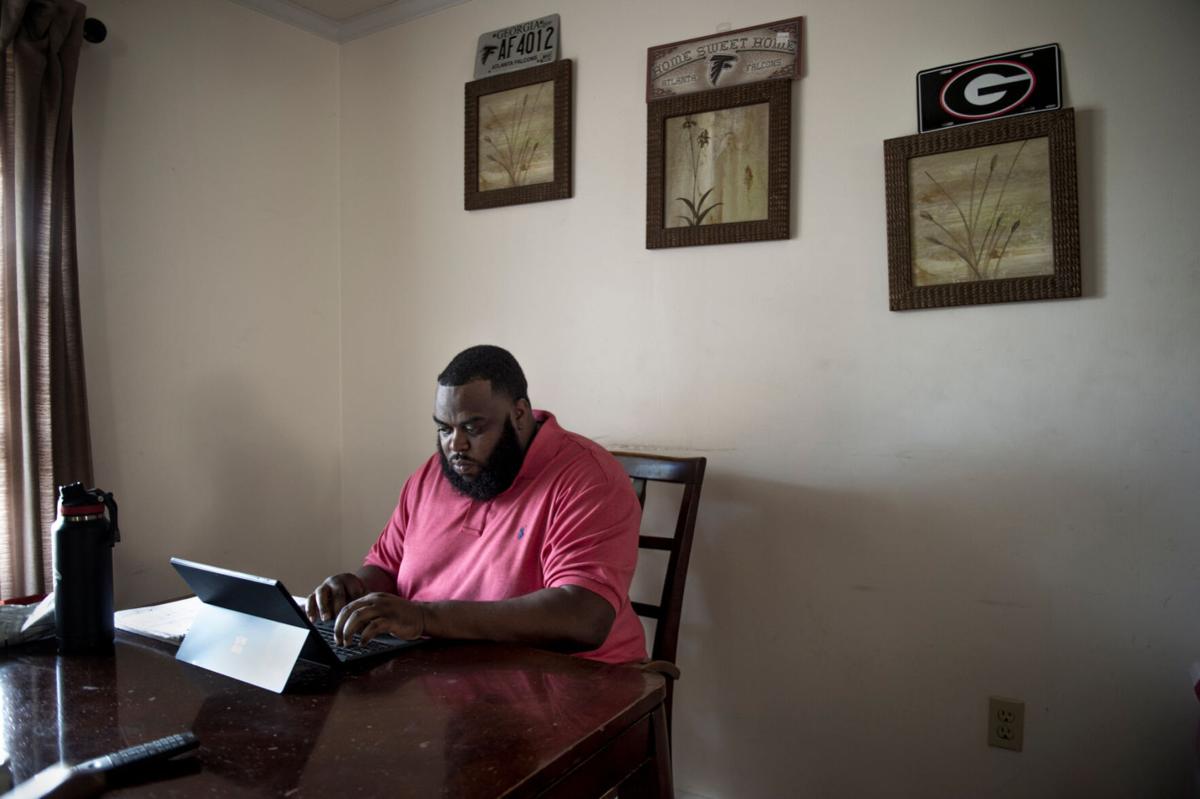Editor's note: Americans have endured economic crises before but none quite like this. To capture the depths of the suffering, The New York Times teamed up with local news organizations across the country, including the Arizona Daily Star, to document the lives of a dozen Americans who found themselves out of work. Find the entire project here.
Allen Walker, 38, joined the Army immediately after high school and spent 12 years in various roles, including as an ammunition specialist. He was medically discharged after being wounded in Afghanistan, and since then has owned a gourmet popcorn business with friends and earned a college degree in management information systems. But he has struggled to find work since graduation — and the pandemic has made the search that much more difficult and frustrating.
AUGUSTA, Ga. — I wish I had known while I was still in school that I.T. certifications are almost more important than the degree itself. A lot of these jobs require certifications just to get into an entry-level position. I have taken one certification class and passed. I'm working on a few others as well.
I cannot say I “worked in I.T.” in the military like a lot of professionals out there. I think it's more difficult for an individual just starting to get into cybersecurity. If you had experience in the military or got certifications, then I think you have a leg up. I've done some internships, but they were not strictly I.T.-related. Looking back, I wish I would have done something that was more tailored to an I.T. position.
When I first started looking, my resume was not up to par. It had been a while since I had applied for positions. The Wounded Warrior Project helped me work on my resume. They let me know about software that goes through your resume and picks out words and phrases that companies use to eliminate candidates they feel are unqualified. I have a vocational rehab counselor who helps me, too.
But Covid-19 is probably the biggest reason I still can't find employment that I want. Many employees are working remotely, and I think that has hurt the process for a lot of jobs that I've applied for. I've probably applied for around 80 jobs. Most never gave me a call back or an email to notify me.
I would like to stay in Augusta if possible. If not, I understand that to start a career I may have to relocate. That's fine, even though I would prefer not to be so far away from my brothers and cousins and my grandma. But if there's an opportunity for me to start a career, I have to take it.
I'm trying to stay positive. I know that maybe the economy looks bleak, but sometimes things can turn in your favor.
September: ‘I take it one day at a time.’
I’m still in the job search. I’ve been referred for two different positions. I’m still waiting to hear back from them. The tentative job offer I had, I haven’t heard anything from them.
I’ve been to a workshop for pitching and interviewing and stuff like that. I got some ideas on how to do interviews when I do get interviews.
I take it one day at a time. I have some good days and bad days because it’s frustrating. I’d like to have someone help me redo my resume to help me tailor it to exactly the kind of position I’m looking for.
I’ve submitted over 100 applications since April. Some I haven’t heard anything from, and that could be because of a hiring freeze or something like that. The majority of them, I haven’t heard anything. I could say maybe 20 of those called because they at least let you know where you stand. At least I got a response. Not knowing is a little more frustrating to me.
October: ‘More discouraged than encouraged.’
I started a new certificate program, so I’m excited about that. It’s an Amazon Web Services certificate. It would certify me to do cloud services with them. I’ve been doing some virtual job fairs online through some of the veteran services.
Some of the companies that are hiring are jobs I don’t necessarily want. They want entry-level or managerial-type positions, but I’m not trying for those at the moment.
I’m not qualified enough for entry-level cybersecurity because even some of the entry-level positions require two years experience. I’ve seen some where you have to have a master’s degree, and that doesn’t make sense. Most of the time what I’m seeing are help desk jobs, helping people who get locked out of their email or reset password or set up their workstations. That’s OK, but it’s not what I really want to do. I’m willing to take it, just to enter the field and move on.
I may even decide to go back to school and get a master’s degree in cybersecurity and get some more certifications. That might help me out.
I’m more selective since I do have some income coming in, from disability payments from the military. So I can be a little more selective than the next individual who maybe is under the gun.
I try to de-age my resume. My military experience can actually go back to 2000, which can dictate how old I am. So as far as my first job after the military, I put that as 2008.
Even though it’s quote-unquote against the law to discriminate based on age, every company does it. Because at that point you may have a tendency to leave earlier or, since you have more experience in life, you may not want to follow instructions from someone who is younger than you.
At this point, I’m like, whatever, man. I’m probably more discouraged than encouraged because I’m not hearing from a lot of the companies.





